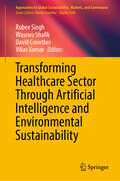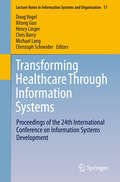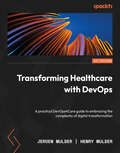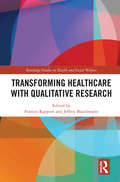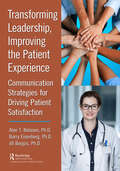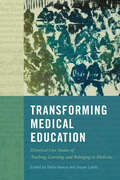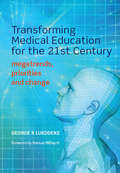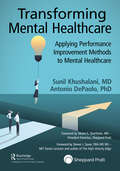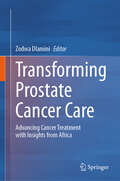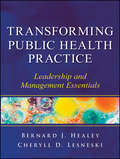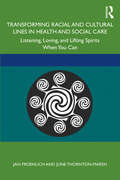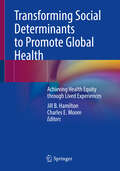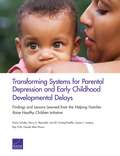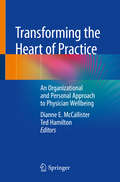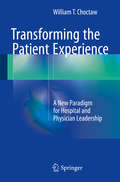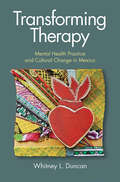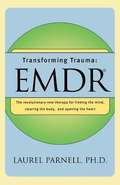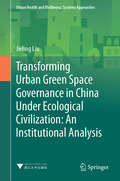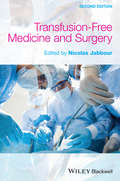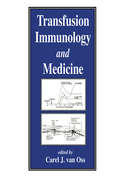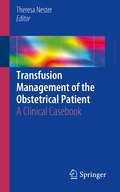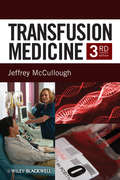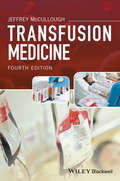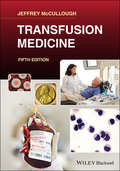- Table View
- List View
Transforming Healthcare Sector Through Artificial Intelligence and Environmental Sustainability (Approaches to Global Sustainability, Markets, and Governance)
by Rubee Singh Wasswa Shafik David Crowther Vikas KumarThis book explores the intersection of artificial intelligence (AI) and sustainability in healthcare, focusing on how AI technologies are transforming medical practices while promoting environmentally responsible operations. It examines how AI-driven tools like machine learning and data analysis enhance diagnostic accuracy, streamline treatment planning, and personalize patient care by analysing large datasets, including genetic information. Additionally, the book addresses how AI can support sustainable healthcare practices by optimizing resource usage, such as energy consumption in hospitals, and improving supply chain management to reduce environmental impact. Practical case studies demonstrate how these technologies are being implemented to improve patient outcomes and achieve sustainability goals. The book considers the integration of AI into human resource management within healthcare, discussing AI's role in recruitment, performance management, and employee retention aligned with sustainability objectives. Ethical and regulatory issues surrounding AI adoption, such as data privacy and algorithmic transparency, are thoroughly examined, with an emphasis on creating responsible and equitable AI systems. Designed for healthcare professionals and administrators, this book provides practical strategies and real-world examples of AI implementation in sustainable healthcare, offering a balanced view of the opportunities and challenges ahead.
Transforming Healthcare Through Information Systems
by Doug Vogel Xitong Guo Henry Linger Chris Barry Michael Lang Christoph SchneiderThis book introduces ongoingreflections within the research community on established information systemsdevelopment topics and emerging concepts, approaches and ideas in the field ofhealthcare information systems. By promoting research on theoretical andmethodological issues related to both information systems development ingeneral and healthcare information systems in particular, it presents currentresearch in order to promote improved practice. It comprises a selection of thebest papers presented at the 24th International Conference on InformationSystems Development (ISD) held in Harbin, China, August 25 - 27, 2015.
Transforming Healthcare with DevOps: A practical DevOps4Care guide to embracing the complexity of digital transformation
by Jeroen Mulder Henry MulderLeverage modern technologies and agile methodologies such as DevOps and microenterprises to deliver sustainable healthcare solutions.Purchase of the print or kindle book includes a free eBook in the PDF format.Key FeaturesDistinguish the pace and time of change to achieve sustainable healthcareApply shared mental models for common understanding of healthcare challenges and how to overcome themApply and integrate new technology to accelerate the digital transformation of healthcareBook DescriptionHealthcare today faces a multitude of challenges, which can be summed up as the barriers architects and consultants face in transforming the healthcare system into a more sustainable one. This book helps you to guide that transformation step by step.You'll begin by understanding the need for this transformation, exploring related challenges, the possibilities of technology, and how human factors can be involved in digital transformation. The book will enable you to overcome inhibitions and plan various transformation steps using the Transformation into Sustainable Healthcare (TiSH) model and DevOps4Care. Next, you'll use the observe, orient, decide, and act (OODA) loop as an iterative approach to address all stakeholders and adapt swiftly when situations change. Further, you'll be able to build shared platforms that enable interaction between various stakeholders, including the technology-enabled care service teams. The final chapters will help you execute the transformation to sustainable healthcare using the knowledge you've gained while getting familiar with common pitfalls and learning how to avoid or mitigate them.By the end of this DevOps book, you will have an overview of the challenges, opportunities, and directions of solutions and be on your way toward starting the transformation into sustainable healthcare.What you will learnUnderstand the need for transformation of healthcareAccelerate transformation using the TiSH modelGet to grips with stepped, networked, and integrated careApply DevOps methodologies for healthcare in DevOps4CareFind out how to handle complexities through the system of systems thinkingBundle and unbundle organizations for the delivery of true patient-centric healthcareWho this book is forThis book is written specifically for enterprise architects and management consultants dealing with transformation in healthcare. Professionals dealing with digital transformation of healthcare, including C-level executives such as chief medical information officers (CMIOs), CEOs, CIOs, and CFOs will also find this book interesting. Basic knowledge of IT systems and architecture will help you grasp the concepts easily.
Transforming Healthcare with Qualitative Research (Routledge Studies in Research Methods for Health and Social Welfare)
by Frances Rapport Jeffrey BraithwaiteDrawing on the knowledge and experiences of world-renowned scientists and healthcare professionals, this important book brings together academic, medical and health systems accounts of the impact of applying qualitative research methods to transform healthcare behaviours, systems and services. It demonstrates the translation of tried-and-tested and new interventions into high-quality care delivery, improved patient pathways, and enhanced systems management. It melds social theory, health systems analysis and research methods to address real-life healthcare issues in a rich and realistic fashion. The systems and services examined include those affecting patient care and patient and professional wellbeing, and the roles and responsibilities of people providing and receiving care. Some chapters delve deeply into the human psyche, examining the very private face of health and illness. Others concentrate on public health and how people’s needs can be met through health promotion and new investments. From real-time case studies to narratives on illness to theories of change, there is something here for everybody. Transforming health systems needs ingenuity – and the drive of individuals, the staying power of systems and above all the involvement of patients. Full of novel ideas and innovative solutions from around the world, all underpinned by qualitative methods and methodologies, this book is a key contribution for advanced students, practitioners and academics interested in health services research, research methods and the sociology of health and illness.
Transforming Leadership, Improving the Patient Experience: Communication Strategies for Driving Patient Satisfaction
by Alan T. Belasen, Ph.D. Barry Eisenberg, Ph.D. Jill Borgos, Ph.D.This book focuses on the patient experience as a leadership strategy. It explores the relationships between coordinated care, expert leadership, provider-patient communications, and the patient experience. When clinical and nonclinical staff collaborate effectively, healthcare teams can improve patient outcomes, prevent medical errors, improve efficiency, and increase patient satisfaction. Surprisingly, however, healthcare leaders tend to prioritize specific metrics to improve hospital performance and patient satisfaction even though patient experience and provider-patient communications are intertwined. Determining the most effective strategy for achieving higher levels of service quality and patient satisfaction can prove elusive for providers. Consider the evidence: a survey in 2012 of more than 17,000 healthcare leaders in North America, for example, found that leaders’ perceptions did not always match the data, and many hospital leaders overestimated the performance of their hospitals. Over 75% of the hospital leaders reported "quality of care" was something their hospital did well, while their patients, on average, rated them lower on perceived service quality. Ten years later, in 2022, only a few providers integrated best practices to achieve high patient satisfaction which severely impacted CMS Hospital Star Rating. This has significant effects on profit margins since patients consider the star rating differentials in their choices of hospitals and are willing to pay upward of 17% extra for treatments in 5-star hospitals, a revenue generating source of income at times when hospitals have seen falling revenues (down 4.8%) and rising labor (up 37%) from pre-COVID-19 pandemic levels. To reduce the gap between perception and reality, hospital leaders can consider the link between communication goals (e.g., responsiveness of hospital staff, pain management, communication about medicines) and outcomes (e.g., increased adherence and compliance, readmission, healthcare delivery costs, hospital overall ratings) as well as improve the patient experience. When intentions and outcomes are aligned, they create a powerful medium by which healthcare leaders can evaluate the gaps that exist between patient care measures and best practices and mitigate organizational or technological factors relevant to improving the patient experience. When the alignment is optimal, care teams develop a better sense of shared purpose, become more committed and accountable, and work together to improve the patient experience. When accomplished, patients participate more fully and actively in the exchange and are discharged with an enhanced commitment to carry out care management requirements. Key topics in this practical guide include provider-patient communications; demonstrating the value of patient-focused care; how physician and nurse executives use synergy as a strategy; engaging board members in promoting quality and safety goals and in developing hospital community partnerships; building bridges between physicians, administrators, trustees, and hospital staff; and developing a leadership pipeline.
Transforming Medical Education: Historical Case Studies of Teaching, Learning, and Belonging in Medicine (McGill-Queen's/Associated Medical Services Studies in the History of Medicine, Health, and Society)
by Delia Gavrus and Susan LambIn recent decades, researchers have studied the cultures of medicine and the ways in which context and identity shape both individual experiences and structural barriers in medical education. The essays in this collection offer new insights into the deep histories of these processes, across time and around the globe.Transforming Medical Education compiles twenty-one historical case studies that foreground processes of learning, teaching, and defining medical communities in educational contexts. The chapters are organized around the themes of knowledge transmission, social justice, identity, pedagogy, and the surprising affinities between medical and historical practice. By juxtaposing original research on diverse geographies and eras – from medieval Japan to twentieth-century Canada, and from colonial Cameroon to early Republican China – the volume disrupts traditional historiographies of medical education by making room for schools of medicine for revolutionaries, digital cadavers, emotional medical students, and the world’s first mandatory Indigenous community placement in an accredited medical curriculum. This unique collection of international scholarship honours historian, physician, and professor Jacalyn Duffin for her outstanding contributions to the history of medicine and medical education.An invaluable scholarly resource and teaching tool, Transforming Medical Education offers a provocative study of what it means to teach, learn, and belong in medicine.
Transforming Medical Education for the 21st Century: Megatrends, Priorities and Change
by George R. LueddekeDrawing on key international reports and input from leading healthcare practitioners and educators worldwide, this ground-breaking book closely examines the real issues facing medicine and medical education. With a wide-ranging, evidence-based approach, the author identifies key drivers of change in both the developing and developed world.He examin
Transforming Mental Healthcare: Applying Performance Improvement Methods to Mental Healthcare
by Sunil Khushalani Antonio DePaoloOne in five U.S. adults experiences a mental illness within a given year. With more than 550,000 people working to support this underserved community, the mental healthcare system has grappled with inadequacies and shortcomings in safety, quality, and care delivery. There is a wide range of problems, from access-to-care issues and errors, to complications stemming from poor care. Our country is also on an unsustainable path as our healthcare expenditure keeps growing. To add to all of this, we are facing a rampant epidemic of burnout among healthcare workers. Modern advancements introduced with many promises—such as electronic medical records, newer medications, or advanced treatments—have created unique challenges when ushered into a highly regulated healthcare system. What does it take to provide patients with everything they need—the right quality of care, at the right time, and at the right cost—to keep them healthy? Which process steps add value? Which steps are wasteful? A widely accepted fact is that a conservative 30-50% of every step in the mental healthcare process does not help patients feel better or stay better. When considering delays in care, workarounds, excessive documentation, and an overuse of auditing, the care system has moved highly skilled clinicians away from providing value, as administrative tasks continue to encroach on their time. There is a clear need to rethink and redesign the system of care. This book is a primer for understanding the current state of the mental health system and the performance improvement skills and leadership acumen needed to address existing challenges. Sheppard Pratt, the award-winning, leading institution for mental healthcare in America, provided the focus on mental healthcare and became the laboratory for this body of work over the course of eight years. It hired a seasoned systems thinker with improvement expertise to work with mental health professionals and solve some of their most complex and chronic problems. The book is a result of the collaboration between a practicing psychiatrist in a leadership role and the systems engineer. Working together, they demonstrate how to think about redesigning care and redefining the nature of work to enhance value for both the people served and the healthcare workforce. They crafted a multi-pronged approach towards culture change at Sheppard Pratt, including implementing a course on "Learning to Improve," which introduced staff to a performance improvement methodology. There are several vignettes interwoven throughout the book that describe the complexities and constraints of the system. Solving some of these challenges creates a new paradigm of work while minimizing waste and enhancing value.
Transforming Prostate Cancer Care: Advancing Cancer Treatment with Insights from Africa
by Zodwa DlaminiThis book is an in-depth examination of the current state of the art and new advances in prostate cancer care and offers a fresh perspective with insights from Africa. At its core, the book tackles pivotal questions such as the mechanisms behind prostate cancer development, the significance of early detection, and how diagnostic advancements can lead to personalized treatment plans. It delves into genomic discoveries that are paving the way for targeted therapies and examines how immunotherapy is reshaping treatment paradigms. Furthermore, it explores surgical innovations and the role of radiopharmaceuticals in advancing prostate cancer management. The discussion extends to integrative care models that emphasize holistic patient well-being and strategies for enhancing survivorship. Unique about this book is that the authors provide insights from Africa into the prevalence and management of prostate cancer and place this in a global context. Aimed at healthcare professionals involved in oncology and prostate cancer research, including physicians, nurses and medical researchers, this book serves as an indispensable guide to the basic biological concepts of prostate cancer and its treatment in the clinic.
Transforming Public Health Practice
by Bernard J. Healey Cheryll D. LesneskiThis text provides students a foundation in public health practice and management, focusing on developing the knowledge and skills required by the real world of public health. The authors of Transforming Public Health Practice explain the drivers of change in public health practice, key success factors for public health programs, dealing with the chronic disease burden, the impact of national health policy on public health practice, and tools for understanding and managing population health.Transforming Public Health Practice covers core leadership and management skills, covering areas such as politics, workforce, partnership and collaboration, change management, outcomes orientation, opportunities for improvement, health equity, and future challenges. Case studies highlight innovations in health education, working with people with disabilities, partnerships in response to disease outbreaks, and health programs. Learning objectives, chapter summaries, key terms, and discussion questions enhance each chapter. A downloadable instructors' supplement is available on the companion Web site for the book.
Transforming Racial and Cultural Lines in Health and Social Care: Listening, Loving, and Lifting Spirits When You Can
by Jan Froehlich June Thornton-MarshThis book proposes an innovative new model for transforming racial and cultural lines in health and social care through communication processes, and introduces listening partnerships as a cost-effective, sustainable intervention to improve communication skills. Transforming Racial and Cultural Lines in Health and Social Care walks the reader through the process of developing the essential skills for racially and culturally effective and compassionate communication. Divided into four parts, the book includes examples that highlight the significance of each skill and provides listening partnerships on each topic. In the final part of the book, Froehlich and Thornton-Marsh interview medical, health, and social care practitioners regarding their experiences in using racially and culturally effective communication to transform health and social care. Improved communication enhances the experience of health and social care for both patients and practitioners and ultimately supports better health outcomes. Transforming Racial and Cultural Lines in Health and Social Care is essential reading for health and social care students looking to improve their communication skills and provide better care.
Transforming Social Determinants to Promote Global Health: Achieving Health Equity through Lived Experiences
by Jill B. Hamilton Charles E. MooreThis unique book addresses the need for the scholarly works that include the voices of clinicians, community stakeholders, and leaders of faith-based institutions in various phases of developing, implementing, and evaluating programs that address health inequities and health disparities among marginalized, middle and low resource communities. Another feature of this book is the contributions to the evidence on SDOH from not only academic researchers but clinicians, community partners, and leaders of faith-based institutions. The overall purpose of this book is really to highlight global community-based programs that have been implemented in marginalized, middle and low resource global communities. The communities represented are rural, urban-inner city, located in Southern, Northeastern, and Western U. S. as well as global communities from Malawi, Kenya, Tanzania, Ethiopia, Botswana, the Grenadines, Nigeria, and Peru. For ease of reading, the editors have further classified these SDOH conditions illustrated in chapters organized according to a 4 pillar SDOH framework of social, cultural, physical environment, social environment, and policy conditions. This book contributes to a diverse perspective of the possibilities of incorporating SDOH into communities and faith-based institutions. The long-range objectives are to inform, inspire, and encourage the novice and senior faculty, clinician, community stakeholder, and faith-based institutional leader to develop, implement, and evaluate SDOH on health and health disparities among the communities they serve.The intended audience of this book is faculty of nursing, public health, and medicine in academic and practice settings; professional leaders of nursing, public health, and medicine; community stakeholders, and leaders of faith-based institutions engaged in partnerships with health care providers. This text might also be useful to faculty of foreign studies, and behavioral sciences.
Transforming Systems for Parental Depression and Early Childhood Developmental Delays
by Dana Schultz Kerry A. Reynolds Lisa M. Sontag-Padilla Susan L. Lovejoy Ray Firth Harold Alan PincusThe Helping Families Raise Healthy Children initiative addressed depression among parents of children with early childhood developmental delays, aligning the early intervention and behavioral health systems with a focus on relationship-based care. The initiative focused on identification of at-risk families, referral, and engagement in services that addressed the needs of parents and young children in the context of their relationship.
Transforming the Heart of Practice: An Organizational and Personal Approach to Physician Wellbeing
by Dianne E. McCallister Ted HamiltonThis unique, step-by-step guide offers a comprehensive exploration of burnout and physician wellbeing, a vital issue that steadily has become widely discussed in the professional and mainstream press. More than twenty chapter authors contribute to this multidimensional volume, including physicians, psychologists, researchers, healthcare administrators, chaplains, professional coaches, and counselors. Section one of the book establishes context, provides a brief overview of the phenomenon of physician burnout, establishes its validity, and makes a case for the reason it has emerged as a critical issue in American healthcare. Section two provides a rationale for healthcare institutions (hospitals, physician groups, medical associations) to make a commitment to physician wholeness, while section three then starts the process of delineating a step-by-step curriculum to address the dilemma, providing additional detail and personal experience direct from the frontlines of combatting burnout. Section four focuses on developing and sustaining a healthy professional culture that is aligned with the mission of the organization, and section five addresses the spiritual component of physician wholeness, Section six concludes the book with two personal essays that poignantly express the nature of two common experiences affecting physicians that require uncommon insight, patience, courage. Transforming the Heart of Practice is a major contribution to the literature and will serve as an invaluable resource for anyone concerned with addressing this crisis in American healthcare.
Transforming the Patient Experience
by William T. ChoctawThis book provides an organizational model of the common ground needed to improve patient care and adapt to today's healthcare environment. The relationship between a hospital CEO and a general surgeon and how they aligned, motivated and partnered with physicians to change the culture of a hospital and implement patient oriented systems is the essential element of this text. Sustainable transformation processes will also be presented for the various roles and contributions of the healthcare team. Written from a team perspective, Transforming the Patient Experience is a practical guide for healthcare team members and leaders to follow.
Transforming Therapy: Mental Health Practice and Cultural Change in Mexico
by Whitney L. DuncanOaxaca is known for many things—its indigenous groups, archaeological sites, crafts, and textiles—but not for mental health care. When one talks with Oaxacans about mental health, most say it's a taboo topic and that people there think you "have to be crazy to go to a psychologist." Yet throughout Oaxaca are signs advertising the services of psicólogos; there are prominent conferences of mental health professionals; and self-help groups like Neurotics Anonymous thrive, where participants rise to say, "Hola, mi nombre es Raquel, y soy neurótica."How does one explain the recent growth of Euroamerican-style therapies in the region? Author Whitney L. Duncan analyzes this phenomenon of "psy-globalization" and develops a rich ethnography of its effects on Oaxacans' understandings of themselves and their emotions, ultimately showing how globalizing forms of care are transformative for and transformed by the local context. She also delves into the mental health impacts of migration from Mexico to the United States, both for migrants who return and for the family members they leave behind.This book is a recipient of the Norman L. and Roselea J. Goldberg Prize from Vanderbilt University Press for the best book in the area of medicine.
Transforming Therapy: Mental Health Practice and Cultural Change in Mexico
by Whitney L. DuncanOaxaca is known for many things--its indigenous groups, archaeological sites, crafts, and textiles--but not for mental health care. When one talks with Oaxacans about mental health, most say it's a taboo topic and that people there think you "have to be crazy to go to a psychologist." Yet throughout Oaxaca are signs advertising the services of psicólogos; there are prominent conferences of mental health professionals; and self-help groups like Neurotics Anonymous thrive, where participants rise to say, "Hola, mi nombre es Raquel, y soy neurótica." How does one explain the recent growth of Euroamerican-style therapies in the region? Author Whitney L. Duncan analyzes this phenomenon of "psy-globalization" and develops a rich ethnography of its effects on Oaxacans' understandings of themselves and their emotions, ultimately showing how globalizing forms of care are transformative for and transformed by the local context. She also delves into the mental health impacts of migration from Mexico to the United States, both for migrants who return and for the family members they leave behind.This book is a recipient of the Norman L. and Roselea J. Goldberg Prize from Vanderbilt University Press for the best book in the area of medicine.
Transforming Trauma: EMDR
by Laurel ParnellEye movement desensitization and reprocessing (EMDR#65533;) has helped thousands of clients haunted by abuse histories or recent traumatic events. It also benefits patients who have not found relief with other therapies and those with chronic conditions or blocked personal and professional performance. EMDR#65533; therapy incorporates eye movements into a comprehensive approach that processes and releases information trapped in the body-mind, freeing people from disturbing images and body sensations, debilitating emotions, and restrictive beliefs. Not only does healing occur much more rapidly than in traditional therapy, but clients also experience a sense of joy, openness, and deep connection with others. EMDR#65533; seems to be a quantum leap in the human ability to heal trauma and maladaptive beliefs.
Transforming Urban Green Space Governance in China Under Ecological Civilization: An Institutional Analysis (Urban Health and Wellbeing)
by Jieling Liu Franz GatzweilerThis book addresses the transdisciplinary subject of urban green space governance in Chinese cities through political sciences, organization theory, sociology, and new institutional economics lenses, with urban planning and ecology perspectives as research foundation and the science of climate change on health and wellbeing research background. It captivates readers by bringing answers to: 1) Why are urban green spaces such a highly contested subject in climate mitigation and adaptation, particularly in contexts like Chinese cities? 2) Why is it important to govern urban green spaces as common-pool resources? 3) How to design policies/institutions that can maximize the end objectives such as good health, wellbeing, and climate resilience? 4) What can ordinary citizens gain from caring more about greening their cities and contributing to the process? Besides, the methods used in this research-case-based study - qualitative in-depth interviews and qualitative content analysis using the mainstream qualitative data analysis software MaxQDA, are valuable learning sources, especially for junior graduate students. The book features three in-depth case studies with rich interview and illustration materials and a range of graphics of higher analytical quality. Readers both from research professionals to non-academics with a general cultural interest in geography would find this work instructive and informative.
Transfusion Free Medicine and Surgery
by Nicolas JabbourThis book aims to be a guide to the practice of blood conservation. The first chapter discusses the legal and administrative aspects of bloodless medicine describing the legal principles and practical issues relatd to refusal of transfusion. The second is on balancing the risks and benefits of transfusion includes clinical vignettes of appropriate and inappropriate transfusion. The remainder of the book covers the principles and practice of bloodless medicine, including a chapter on the scientific issues of haemostasis and the investigation of bleeding idsorders. The book concludes with chapters on blood conservation in neonatal and paediatric surgery, the costs associated with blood transfusion and the quest for artifical blood. New chapters will be included to address blood utilization in oncology and geriatric patients.
Transfusion Immunology and Medicine
by Carel J. van OssBased on the proceedings of the International Convocation on Immunology held recently at the State University of New York at Buffalo, this up-to-date resource provides a state-of-the-art examination of blood transfusion practice and its future possibilities.Explains the immunological effects of blood transfusion as well as its immunological and
Transfusion Management of the Obstetrical Patient: A Clinical Casebook
by Theresa NesterThis clinical casebook covers transfusion medicine theory and its practical implications for the obstetrical hemorrhage patient through the presentation of cases on actively bleeding patients. Each case features a unique clinical scenario involving a bleeding patient and outlines different aspects of safe and effective transfusion support. The cases contain current evidence on the latest topics in the field, such as the use of antifibrinolytic agents and coagulation factor concentrates in the setting of massive obstetrical hemorrhage. In addition to the actively bleeding patient, the casebook includes other important management topics, including the role of plasma exchange in thrombotic microangiopathies during pregnancy; treatment of hyperhemolysis in a patient with hemoglobinopathy; and recommended management of patients with red cell antibodies found on prenatal testing. Other immunohematology topics such as post-natal management of an RhD negative woman for the prevention of hemolytic disease of the newborn due to anti-Rh(D) are included.Written by transfusion medicine, coagulation, obstetrical, and anesthesiology experts, Transfusion Management of the Obstetrical Patient: A Clinical Casebook is a concise yet comprehensive resource for anesthesiologists, obstetricians, pathologists, hematologists, and other practitioners who treat obstetrical hemorrhage patients.
Transfusion Medicine
by Jeff McculloughTransfusion Medicine offers a concise, clinically focused and practical approach to this important area of medicine.This well-known handbook presents the experience of a world leader in the field of blood banking and transfusion therapy. Transfusion Medicine offers complete guidance on the full range of topics from donor recruitment, blood collection and storage, to testing and transfusing blood components, complications and transmissible diseases, as well as cellular engineering, therapeutic apheresis, and the role of hematopoietic growth factors.This third edition includes updated information on a number of areas including:Current debate on clinical effects of stored red blood cellsEmerging infectious diseases and impact on blood safetyNew concepts of massive transfusionWorld blood supplyPlatelet transfusionPathogen inactivationTransfusion Medicine will be valuable to all those working in the field of blood banking and transfusion. It is a good introduction to transfusion for hematology or oncology fellows and technologists specialising in blood banking.
Transfusion Medicine
by Jeffrey McculloughTransfusion Medicine provides a concise, clinically focused and practical approach to the field of blood banking and transfusion therapy written by international expert, Jeffrey McCullough MD. Concise, approachable, yet comprehensive approach to the field of transfusion medicine and blood banking Offers extensive guidance on important topics such as; donor recruitment, blood collection and storage, donor testing and clinical uses of blood components, techniques of administration of blood components, complications of transfusion, transmissible diseases, the HLA system, and many more Provides new content on patient blood management systems, the changing indications for red cell transfusion, new transmissible disease agents, management of massive blood loss, pathogen reduced blood components, therapeutic apheresis including photopheresis, management of massive transfusion and new cellular therapies. Discusses global blood supply and US blood supply organizations and their consolidation and reorganization Reviews other topics of current interest, such as mitigation strategies for TRALI prevention, effects of storage of blood on adverse effects, management of massive blood loss and massive transfusion protocols pathogen inactivation, and granulocyte transfusion Extensively referenced for further study
Transfusion Medicine: A Practical Guide
by Jeffrey McCulloughExplore this concise and clinically focused approach to the field of blood banking and transfusion therapy The Fifth Edition of Transfusion Medicine delivers a succinct, thorough, clinically focused, practical and authoritative treatment of a full range of topics in transfusion therapy. This ranges from issues with the blood supply, recruitment of both whole blood and apheresis donors, blood collection and storage, blood testing, blood safety, and transmissible diseases. This edition has been fully updated and revised to include exciting cellular therapies for cancer, transplantation of both hematopoietic cells and solid organs, infectious diseases and regenerative medicine. The Fifth Edition includes new authors with highly relevant content that provides a solid grounding for readers in the field. The book: Is an approachable comprehensive guide to the field of blood banking and transfusion medicine Provides complete and timely perspective on crucial topics, including the HLA system in transfusion medicine and transplantation and quality programs in blood banking and transfusion medicine Is extensively referenced, making it simple for readers to conduct further research on the topics of interest to them Includes new chapters on pediatric transfusion medicine and pathogen reduction Has an expended chapter on patient blood management Provides extensive discussions of the clinical use of blood transfusion in a wide variety of clinical situations including recent development In the management of acute traumatic blood loss Provides updated information about blood groups and molecular testing making inroads into clinical practice along with discussions of laboratory detection of blood groups and provision of red cells Perfect for all those working in the field of blood banking, transfusion medicine and hematology or oncology and fellows in pathology, hematology, surgery and anesthesiology. Transfusion Medicine is a good introduction for technologists specializing in blood banking and non-medical personnel working in areas related to hematology and transfusion medicine. Transfusion Medicine will also earn a place in the libraries of practicing pathologists with responsibility for blood banks.
